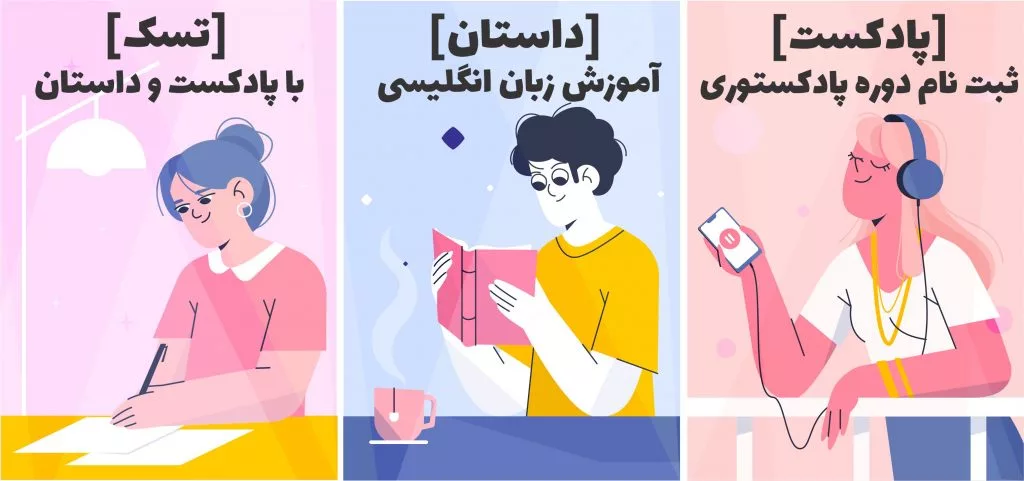پادکست انگلیسی BBC – شادی رذیلانه
در زبان آلمانی یه کلمه ی باحال وجود داره که البته در انگلیسی هم به همون شکل به کار میره: “schadenfreude” (شادنفرویده) و معنی اش میشه: کسی که از ناراحتی یا بدشانسی دیگران خوشحال میشه (دگرغمشادی یا شادی رذیلانه). آیا پیش اومده که یه وقتهایی از بدشانسی کسی که ازش خوشتون نمیاد خوشحال بشین؟ خب اگه این مدلی هستین پس شما یه schadenfreude هستین! (نظر خودتون رو به انگلیسی در بخش دیدگاه با ما در میون بذارید!) در پادکست انگلیسی BBC – شادی رذیلانه میشنویم که راب و نیل درباره ی این کلمه ی آلمانی صحبت می کنند و در طول مسیر هم کلمات جدیدی آموزش میدن.
سوال پادکست انگلیسی BBC – شادی رذیلانه :
False cognates – also called false friends – are words that look the same in two languages but have different meanings. In English we have the word ‘rat’ but what does that mean in German? Is it…
a) a big mouse
b) annoyed
c) advice
به پادکست خوب گوش کن تا جواب رو پیدا کنی.
اگر می خوای گوش دادن به پادکست تا حد امکان برات ساده و کارآمد باشه مراحل زیر را دنبال کن:
هر روز به پادکست گوش کن. وقتی براش یه وقت ثابت در روز در نظر بگیری برات تبدیل به عادت میشه و این عادت هرروز پیشرفت میکنه.
پادکستی رو پیدا کن که موضوعش برات جالب باشه. وقتی از خود موضوع لذت ببری یادگیری هم برات لذتبخش میشه.
به پادکستی گوش کن که transcript یا متن داره. این بهت کمک می کنه تا کلمات و عبارات جدید رو به سرعت در متن پیدا کنی و ساختار انواع مختلف جمله رو خوب یاد بگیری.
پس از گوش دادن به پادکست با متن، در مرحله بعدی سعی کن بدون نگاه کردن به متن این کار رو انجام بدی. این کار مهارت شنیداری رو تقویت می کنه و کمک می کنه تا انگلیسی زبانان بومی را راحت تر درک کنی، حتی اگر خیلی سریع صحبت کنن.
اگه به پادکست انگلیسی گوش کردی و نتونستی کامل متوجه اش بشی، ناامید نشو. پادکست هایESL -English as Second Language بیشماری وجود دارن که برای سطوح مختلف، از ابتدایی تا پیشرفته طراحی شدن. مطمئنا هر روز می تونین یه پادکست مناسب با سطح خودت پیدا کنی.
فراموش نکن که هرچی بیشتر تمرین کنی در اون مهارت رشد میکنی! به قول انگلیسی ها: Practice makes perfect
واژگان کلیدی پادکست انگلیسی BBC - شادی رذیلانه
| معنی به فارسی | معنی به انگلیسی | واژه |
| دگرغمشادی /شادی رذیلانه | the satisfying feeling you get when something bad happens to someone else | schadenfreude |
| واژگان قرضی | a word from one language that is used in another language without being changed | loanword |
| مزد عمل بد | a person’s misfortune that is considered to be deserved punishment for something bad that they have done | comeuppance |
| انصاف | punishment someone receives that is fair for what they have done | justice |
| آدم دورو | people who claim to have certain moral beliefs but actually behave in a way that shows they are not sincere | hypocrites |
| دلداری دادن به | expressing sympathy to someone about their bad luck | commiserate |
BBC 6 minute English -The benefits of schadenfreude

متن پادکست انگلیسی BBC - شادی رذیلانه
Note: This is not a word-for-word transcript
Neil
Hello and welcome to 6 Minute English, I’m Neil. This is the programme where in just six minutes we discuss an interesting topic and teach some related English vocabulary. And joining me to do this is Rob.
Rob
Hello.
Neil
In this programme we’re discussing schadenfreude.
Rob
Hold on, Neil – schadenfreude – that’s a German word.
Neil
Schadenfreude is what we can call a loanword – a word from one language that is used in another language without being changed.
Rob
So you’re right – schadenfreude is used in English and am I right in thinking it describes the satisfying feeling you get when something bad happens to someone else?
Neil
You’re right, Rob. Imagine you’re in a queue at the supermarket and someone pushes in, but when they got to pay, their credit card doesn’t work – think of the feeling you might get just seeing their misfortune – another word for bad luck.
Rob
Yes, that is a very satisfying feeling – but it’s quite a mean feeling too.
Neil
It is but we’ll be discussing why that feeling could actually be good for us. But first, let’s set a question for you, Rob, and our listeners at home, to answer. This is about false cognates – also called false friends – words that look the same in two languages but have different meanings. So in English we have the word ‘rat’ but what does that mean in German? Is it…
a) a big mouse
b) annoyed or
c) advice
Rob
That’s tricky because I don’t speak German. So I’ll guess and say b) annoyed.
Neil
Well, I’ll have the answer later on. Now, let’s talk more about schadenfreude. Enjoying someone’s misfortune can certainly make us feel good.
Rob
And studies have shown this feeling is quite normal – particularly when is happens to someone we envy. If we see a wealthy celebrity suffering on a reality TV show, or are exposed for not paying their taxes, we feel good. We say they’ve had their comeuppance.
Neil
That’s a good word – meaning a person’s bad luck that is considered to be deserved punishment for something bad that they have done.
Rob
Let’s hear from psychologist Wilco Van Dijk from the University of Leiden, who’s been talking about this on the BBC Radio 4 programme, All in the Mind. What have his studies found about our enjoyment of others misfortune?
Wilco Van Dijk, psychologist, University of Leiden
People especially feel schadenfreude when they think the misfortune is deserved. Then the question is where this joy arises, is this actually joy experienced towards the misfortune of others or is it also at least partly about a just situation – that this misfortune of another actually appeals to a sense of justice. That’s also the reason why we like the misfortune of hypocrites because if they fall down that also is a deserved situation.
Neil
OK, so Wilco Van Dijk’s studies found we get joy when someone’s misfortune is deserved – there is justice – in other words, the punishment someone receives is fair.
Rob
And a just situation means a fair situation – it is right. So I guess he’s saying we’re not just being mean.
Neil
Yes. And he also mentioned the type of people whose misfortune is just and deserved, are hypocrites – people who claim to have certain moral beliefs but actually behave in a way that shows they are not sincere.
Rob
The All in the Mind programme also heard from another expert on the subject – author and historian of emotions, Dr Tiffany Watt-Smith. She talked about how schadenfreude is a subjective thing – based on our feelings – and it’s not as simple as deciding what is right or wrong. What word does she use that means to express sympathy to someone about someone’s bad luck?
Dr Tiffany Watt-Smith, author and historian of emotions
We don’t really experience emotions, you know, as either-or things, it’s not black or white. I think it’s perfectly reasonable that we could genuinely commiserate with someone else’s misfortune at the same time as a terrible sly smile spreading across our lips because, you know, something we’ve envied about them has turned out not to work out so well or whatever it is. You know, we have a much deeper ability to hold contradictory emotions in mind, much more so than your average moral philosopher would allow.
Neil
Interesting stuff. She says when something goes wrong for someone, we have the ability to commiserate with them – that’s the word for expressing sympathy to someone about their bad luck.
Rob
So overall, Tiffany Watt-Smith thinks we have a range of emotions when we experience schadenfreude – but these are contradictory emotions – different and opposite emotions. Maybe, Neil, we should just be nicer people?
Neil
No way! I loved seeing Germany getting knocked out of last year’s World Cup – not really! Talking of Germany, earlier we mentioned false friends and I asked in English we have the word ‘rat’ but what does that mean in German? Is it…
a) a big mouse
b) annoyed
c) advice
And, Rob, you said…
Rob
I said b) annoyed.
Neil
And that is the wrong answer, I’m afraid. The right answer is c) advice. Well done if you knew that at home. Now on to the vocabulary we looked at in this programme.
Rob
So today we’ve been talking about schadenfreude – that describes the satisfying feeling you get when something bad happens to someone else.
Neil
And that’s an example of a loanword – a word from one language that is used in another language without being changed. In this case German.
Rob
We mentioned comeuppance which describes a person’s misfortune that is considered to be deserved punishment for something bad that they’ve done.
Neil
Next we mentioned justice – that’s the punishment someone receives that is fair for what they’ve done. And the word just describes something that is fair and right.
Rob
Hypocrites are people who claim to have certain moral beliefs but actually behave in a way that shows they are not sincere.
Neil
And finally commiserate is a word that means expressing sympathy to someone about their bad luck. That’s the verb. The noun form is commiseration.
Rob
Well commiserations, Neil. We’ve run out of time for this programme. See you soon, goodbye.
Neil
Goodbye!
امیدوارم از پادکست انگلیسی BBC - شادی رذیلانه لذت برده باشید.
گوش دادن به پادکست روش خوبی برای تقویت مهارت شنیداری و هم چنین یادگرفتن کلمات در بستر یک موضوع خاصه که این به تقویت مهارت مکالمه انگلیسی نیز کمک زیادی می کنه.
اگه تو هم از اون آدمهایی هستی که از گوش دادن به پادکست لذت می بره برات یه خبر خوب دارم! آموزشگاه زبان انگلیسی 24talk یه دوره طراحی کرده مبتنی بر پادکست و داستان کوتاه به اسم "پادکستوری - Podcastory". این دوره سعی کرده یادگیری زبان انگلیسی رو مناسب با نیاز و سطح زبان آموز به یه فرایند بسیار مفرح، موثر، سریع و کم هزینه تبدیل کنه.
همین الان می تونی با کلیک روی عکس زیر و ثبت نام در دوره ی آموزش زبان انگلیسی با پادکست و داستان ۲۴talk اولین و مهم ترین قدم رو برای یادگیری زبان انگلیسی برداری. وقت رو از دست نده!








